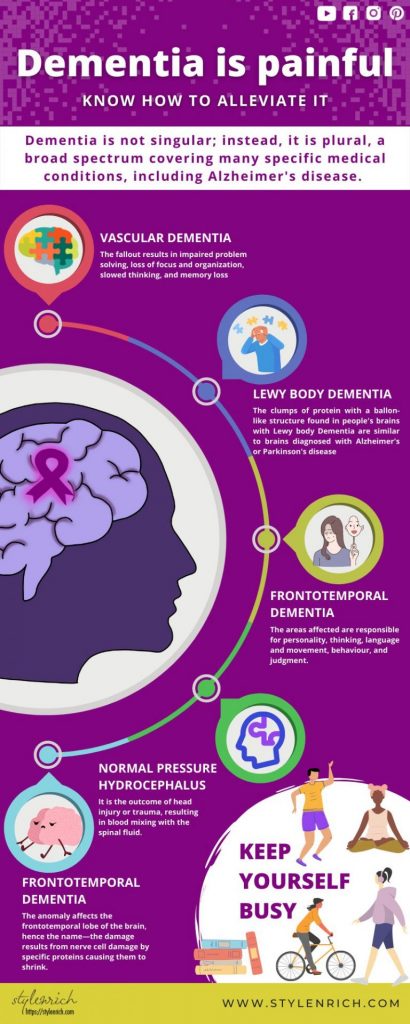Frustrating memory loss, difficulty communicating, finding it hardpressed to express, problems with visual and spatial perceptions, often getting lost in the process of walking or driving, subdued reasoning or problem-solving and failing miserably at complex tasks. These symptoms are more than a nightmare to the sufferer and the care-taker. The pain gets compounded when the patients involved are your own parents. We empathize with you while being awed at your grace in handling such patients.

What is Dementia?
Dementia is not singular; instead, it is plural, a broad spectrum covering many specific medical conditions, including Alzheimer’s disease. What usually begins as symptoms aggravate a decline in cognitive abilities, severely hindering one’s independence and daily routines. Even one’s identity concerning behaviour, feelings, and relationships change.
Possible causes for Dementia
Dementia affects people differently. The condition gets characterized by damaged nerve cells or their loss, resulting in connections that misfire in the brain. The damaged area of the brain will also differ from person to person. While the symptoms exhibited vary, some diseases seem like Dementia in a person. However, they could be reactions to medications or perhaps even vitamin deficiencies.
Progressive Dementias
The most common of Dementias, it afflicts people across all ethnicities. Experts are aware of a certain percentage of cases related to gene mutations. The defective chromosomes pass through the generational line from parent to child. While several genes are at play in Alzheimer’s disease, apolipoprotein E4 (APOE) is prominent.
Plaques and tangles are typical of such patients’ brains. Clumps of beta-amyloid protein and tangles made up of tau protein damage healthy neurons and the fibres connecting them.
Vascular Dementia
Damage to the brain’s blood vessels is the cause of Vascular Dementia. Sometimes the brain suffers a stroke due to a similar rupture causing damage to the brain’s white matter. The fallout results in impaired problem solving, loss of focus and organization, slowed thinking, and memory loss.
Damage to the brain’s blood vessels is the cause of Vascular Dementia. Sometimes the brain suffers a stroke due to a similar rupture causing damage to the brain’s white matter. The fallout results in impaired problem solving, loss of focus and organization, slowed thinking, and memory loss.
Lewy body Dementia
The clumps of protein with a ballon-like structure found in people’s brains with Lewy body Dementia are similar to brains diagnosed with Alzheimer’s or Parkinson’s disease. Such a mental progression is evident by acting out one’s dreams in sleep, loss of focus and attention and even hallucinations.
Other symptoms associated with Parkinson’s include rigidity, slow movement, and tremors.
Frontotemporal dementia
The breakdown of nerve cells results in dead connections in the frontal and temporal lobes of the brain. The areas affected are responsible for personality, thinking, language and movement, behaviour, and judgment.
Symptoms include:
- Memory loss
- Impaired motor skills
- Confusion
- Depression
- Hallucinations
- Urinary Incontinence
- Language struggles
- Inappropriate emotional outbursts
- Difficulty concentrating or focusing
- Declining planning and judgment skills
Normal Pressure Hydrocephalus
It is the outcome of head injury or trauma, resulting in blood mixing with the spinal fluid. The build-up clogs and hinders brain fluid from being released through the spine. It gets pushed into the brain’s ventricles or cavities. One estimate puts it over 700,000 Americans afflicted with this disorder. Initially, less than 20% get a correct diagnosis as it gets passed on as Alzheimer’s, Parkinson’s or even effects of normal ageing. Remedial pressure relieving measures involve inserting a shunt mechanism from the brain to the abdomen to flush out excess fluid.
The primary symptoms of NPH include:
- Urinary Incontinence
- Mood changes
- Difficulty making decisions
- Difficulty with balance (even walking)
- Short-term memory loss
Frontotemporal Dementia
The anomaly affects the frontotemporal lobe of the brain, hence the name—the damage results from nerve cell damage by specific proteins causing them to shrink. Researchers are yet to pinpoint its exact cause.
The tell-tale signs include
- Compulsions (repetitive actions)
- Difficulty speaking or writing
- Poor comprehension
- Muscle weakness or atrophy
- Apathy
- Aggression
- Lack of empathy
- Unusual food cravings
A few types of Dementia commonly cause urinary Incontinence
A degenerative process in the brain raises so many red flags; Urinary Incontinence is prime. The victim might suddenly forget to undress or how to use a toilet. Sometimes, patients fail to perceive the urge to urinate, resulting in involuntary discharge.
1 How to alleviate when ageing parents are involved?
If your parents show similar symptoms, you must understand them in the current context.
Figure out their needs and the options available to meet them.
The assessment can be overwhelming the first time you deal with such a sensitive issue. Observe and grade against the following parameters.
- Cognitive health
- Mobility
- Personal hygiene
- Meal preparation
- Social interaction
- Family support
- Home Safety
- Medical needs
2 Think about your coping abilities and needs
Don’t allow emotions to cloud your judgement. Draw a fair assessment of your needs and how much you can stretch helping.
Grade against the following parameters
- Is your relationship mature enough to spend much time with your affected parent?
- Are you strong enough to care for an adult?
- Is your house close enough to allow frequent visits?
- Will you be willing to learn to provide Palliative Care?
- Will you be ready to move down to their place of living or vice-versa if the need should arise?
3 Involve your loved ones in the decision-making process
No parent wants to lose their independence, especially when they have come all the way rearing up their children. So it’s best to partner with one’s parents while making such decisions. They might not be giving into it initially but will eventually agree with multiple attempts. If the mental progression is not that serious, don’t force many changes. Give it time—Amp up the support as needed or in an emergency. Let them get used to the new routine.
4 Estimate the financials involved
Any care costs money. So factor in all possible costs short and long-term. Once you have the financial blueprint sorted, you will know if they will need help or what.
If the projected expenses seem to mount, you will have to seek any other Government or private-based program streamlined for such causes. It would be wise to seek a financial planner to set up a case that will qualify your loved ones for Medicaid.
5 Highly imperative to keep your loved ones engaged
The brains need to get exercised. Make them busy to the core. The more mental challenges, the brain decline gets slowed down. As the condition progresses, learning new skills becomes increasingly tricky. So a routine will help them stick best to get familiar with the following activities. They can practice some of the workouts daily.
6 Choose the right timing for every activity
Before an activity gets given, ensure their engagement is not with anything else. This way, you confirm that you have their complete attention. If they seem to linger on with what they are doing, then call off the new assignment for a while. Since their faculties are compromised, you must display extraordinary patience and tread carefully to avoid all possible triggers of over whelmingness. If they seem stressed after a particular activity, be quick to help them unwind by making them listen to music. Symptomatic improvisation is the key.
7 Match every activity as per ability
Involve professional healthcare providers to decide if a particular activity is just the right fit or not for your loved one. As long as possible, make each activity creative and exciting so that it is enjoyable while executed.
Activities like painting are suitable because it is something with which the patient can relate even much after the exercise.
8 Give them a game break-Think how to alleviate.
Remember when you were a small child? What did your parents gift you to play with? Do Snakes and Ladders and Ludo ring bells? It is time for your loved ones to play with the same as they enter their phase of second childhood. Simple, fun games will boost their confidence.
9 Playing Trivia can be therapeutic
In a study published by Dr Robert Wilson and his team at Rush University Medical Center, they found that playing trivia games was beneficial for patients who have Dementia. Most of the 1100 people they tracked had an average age of 80. They observed in the temporal and hippocampus regions of the brain of such patients that similar mental activities staved off the symptoms of Dementia.
10 Play crossword with them
Several studies point to the connection between playing crosswords and slowing down memory decline in patients diagnosed with Dementia. One study states that regular playing of such games delays memory decline by 2.5 years in those suffering from similar mental disorders.
11 Puzzle them with interest in solving puzzles
Patients with Dementia mostly become moody and withdrawn. In such instances, puzzles can help them become more interested in things. Choose jigsaw puzzles to stimulate their brains and establish a social connection with caregivers and loved ones on a positive note.
13 Please help them to focus
When such patients spend time with the people they love the most, they look forward to it and focus. Such group gatherings and activities daily add mental exercises to a patient with Dementia, helping them to reduce stress.
14 Instill a sense of productivity
Dementia is a painful tag that sticks with those affected. So to help the elderly distract while feeling productive, activities should be lined up for them to accomplish daily. It is imperative to keep their immediate environment positive. You must follow due diligence in finding it challenging to achieve objectives and rule them out.
15 Could you help them with a Cardio-Workout?
Cardio is excellent, provided they can do it aided or unaided. Cardio exercises increase oxygen and blood flow to the brain.
16 Ride a tandem bicycle
Please help them to enjoy riding while taking some of the balancing load off them. If not comfortable, try using a three-wheeled bicycle for better balance and ease of riding.
17 Explore the power of touch
Hand massage gets accepted mainly by the elderly, and even a five-minute hand massage elicits powerful relaxation, decreasing cortisol levels.
18 Go for a walk
Walking is an all-around exercise that involves every limb and part of the human body. Specific findings point out that walking a few times every week might alter the progression of the disease while promoting overall physical wellbeing.
19 Shake a leg
Dancing is rejuvenating and healing doled out on the same plate. It has a lot of benefits, even if it is simple square dancing; Even those who don’t dance should be encouraged to give it a shot. It is a powerful exercise in disguise with the following benefits
- improves balance and spatial awareness
- increased physical confidence
- improved mental functioning
- improved general and psychological wellbeing
- greater self-esteem and self-confidence
- better social skills.
- increased aerobic fitness
- improved strength and muscle tone
- Superior weight management
- stronger bones to keep Osteoporosis at bay
- better coordination, agility and flexibility
- improved functioning of your heart and lungs
- increased endurance and motor fitness
20 Practice Meditation
Meditation puts to work all the areas of the brain besides helping the organ to form new connections while recovering from injuries stimulating powerful neuroplasticity.
21 Encourage the idea of journaling
While it is an excellent way to keep the mind active, it also eases the stress of a person with Dementia.
22 Take them out on a trip
Travelling liberates the human persona. It boosts creativity, happiness, satisfaction, and mental health while relieving stress. Museums are ideal places to hang around with families opening new vistas to socialize with people.
23 Encourage Reading
Reading fires up one’s imagination and should be utilized as an effective tool to stall the symptoms of any form of Dementia. There is ample research to prove that Reading boosts memory and benefits, life-long readers against the encroachment of amyloid burden, tangles, and Lewy bodies. It also fights memory decline in old age by 30 per cent.
24 Crack Jokes
Laughing is indeed chicken soup for the soul. Laughing seems silly; the things it can do to the overall human system are no laughing matter. It brings about a bountiful of physical changes. Relieving your stress, strengthening your immune system and revitalizing many internal organs are some things regular laughing riots can induce in you.
Face the truth and do some soul searching
All the care we invest in for our loved ones will not rewind time or arrest the mental progression. Face it head-on; while you do, it is best to see a professional counsellor keep you from losing it. We empathize when you feel crushed to see that formerly strong parent who guided you now in dire need of help.
Conclusion
Take heart for everything that happens is for a reason. While at the outset, it seems the end of the world for you, internally, you are getting transformed into a personality for which life grooms you. Hence take solace that all the suffering you go through is the raw material used by the Divine to manifest the real you. Take Care, and God Bless…

















